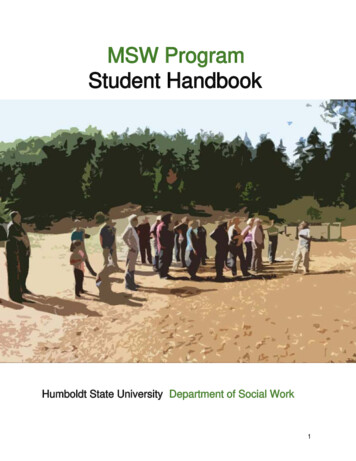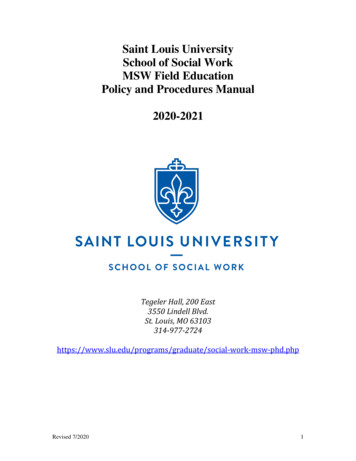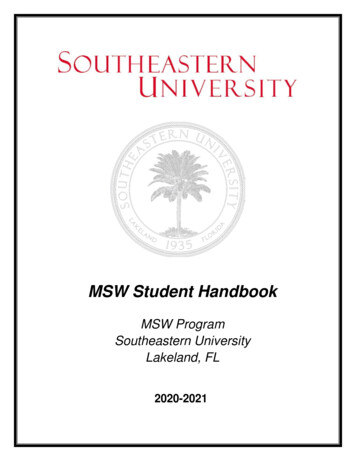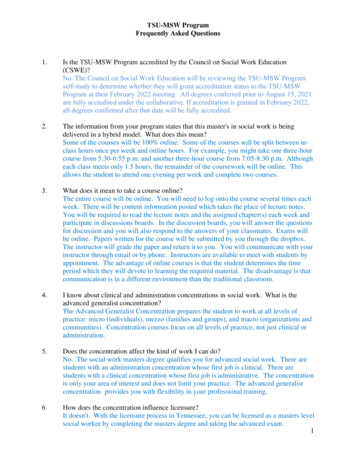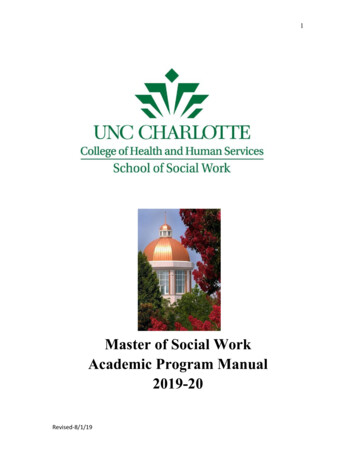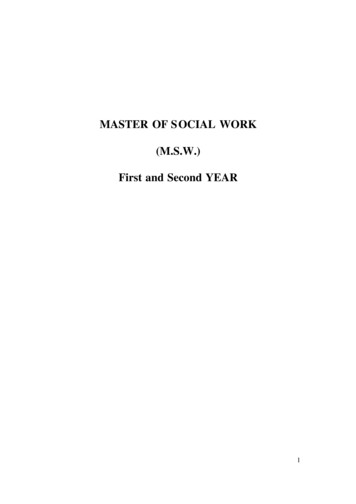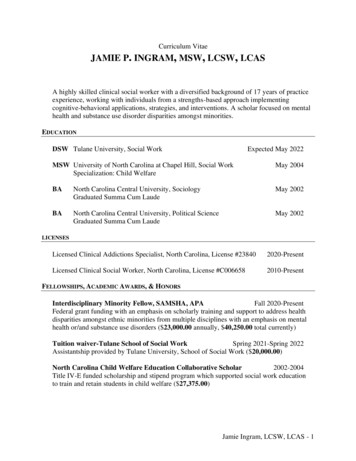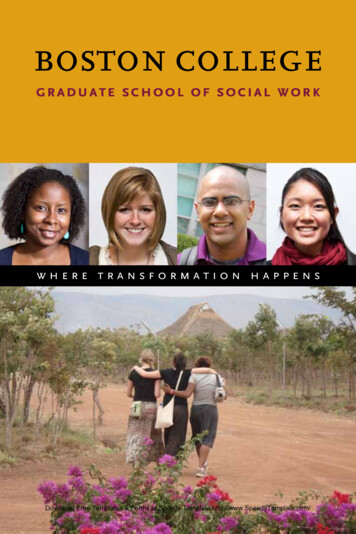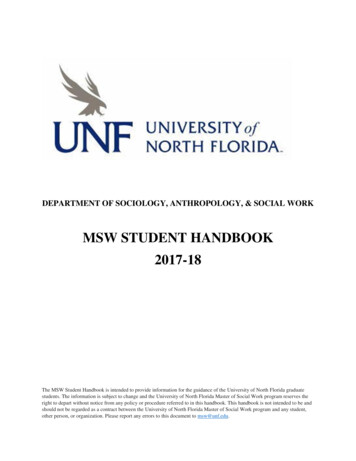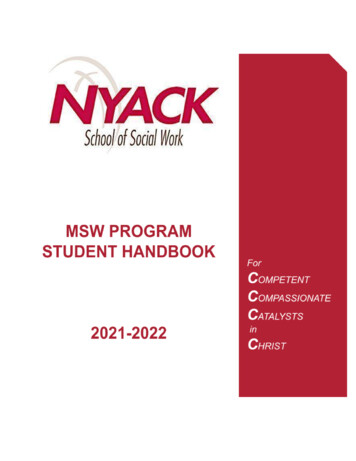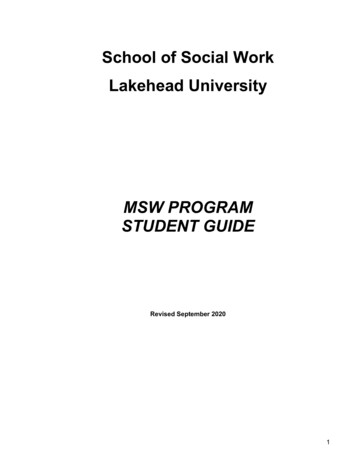
Transcription
School of Social WorkLakehead UniversityMSW PROGRAMSTUDENT GUIDERevised September 20201
TABLE OF CONTENTS1. INTRODUCTION 52: PROGRAM DESCRIPTION AND SCHOOL MISSION STATEMENT (a) PROGRAM DESCRIPTION .(b) SCHOOL OF SOCIAL WORK MISSION STATEMENT .6673. REGISTRATION .ADVANCED STANDING CREDITS .TRANSFER CREDITS .FULL TIME PROGRAM .10101011REGISTRATION STATUS FULL TIME FULL TIME STUDENTS AND PAID WORK .CONTINUANCE OF REGISTRATION .TIME TO COMPLETION .TIME EXTENSIONS .LEAVES OF ABSENCE PART TIME .11111212121313134. AWARDS, SCHOLARSHIPS AND FINANCIAL AID . 14(a) SCHOLARSHIPS, BURSARIES AND AWARDS . 14(b) FINANCIAL AID 145. GRADUATE ASSISTANTSHIPS .(a) CONDITIONS .(b) ASSIGNMENT OF GRADUATE ASSISTANTSHIPS . (c) ROLES AND RESPONSIBLITIES OF GRADUATE ASSISTANTS .(d) PAYMENT SCHEDULE (e) BENEFIT DETAILS 1415151515166. WHO’S WHO AND WHAT THEY DO: ROLES AND RESPONSIBILITIES .(a) GRADUATE PROGRAM COORDINATOR .(b) OFFICE AND DEAN OF GRADUATE STUDIES (c) FACULTY SUPERVISOR .(d) GRADUATE PRACTICUM COORDINATOR .(e) PRACTICUM SUPERVISOR .(f) OFF SITE FIELD SUPERVISOR .(g) THESIS COMMITTEE MEMBER .(h) MSW COMMITTEE (i) GRADUATE STUDENTS’ CHECKLIST OF RESPONSIBILITIES .161618182121212222227. ORGANIZATION OF THE MASTER’S PROGRAM .(a) PRACTICE/PROJECT TRACK PROCEDURES (b) ETHICS REVIEW (c) RESEARCH/THESIS TRACK PROCEDURES .242728282
8. PRACTICUM . 29POLICY FOR PLANNING & CONDUCTING AND COMPLETING THE MSW PRACTICUM 29ACADEMIC ACCOMMODATION FOR FIELD PLACEMENTS . 29REQUIREMENTS FOR PLANNING A PRACTICUM 30MSW FIELD PRACTICUM STUDENT AGREEMENT . 32PRACTICUM INSURANCE COVERAGE 32AGENCY-SCHOOL OF SOCIAL WORK MSW PRACTICUM AGREEMENT . 32CRIMINAL RECORDS SEARCH/VULNERABLE SECTOR CHECK . 33OTHER REQUIREMENTS . 33PLACEMENT PLANNING FLOW CHART . 34REQUIREMENTS FOR COMPLETING A PRACTICUM . 35PLACEMENT JOURNEY FLOW CHART 39STUDENTS EXPERIENCING PLACEMENT DIFFICULTIES . 409. ACADEMIC PERFORMANCE . 41(a) GRADING SYSTEM . 41(b) GRADING POLICY 4110. APPEAL PROCESS . 4211. AUTHORSHIP GUIDELINES . 4212. REQUIREMENTS FOR GRADUATION 4213. FACULTY PRACTICE AND RESEARCH INTERESTS . 4314. OTHER RESOURCES . 46(a) SCHOOL OF SOCIAL WORK RESOURCES 46(b) UNIVERSITY RESOURCES . 4715. IMPORTANT SCHOOL OF SOCIAL WORK POLICIES . 48APPENDIX A: GRADUATE ASSISTANTSHIP INFORMATION . 50GRADUATE PERFORMANCE REVIEWS (ARTICLE 17) . 52APPENDIX B: MSW FIELD PRACTICUM STUDENT CHECKLIST . 53APPENDIX C: MSW FIELD PRACTICUM STUDENT AGREEMENT 55APPENDIX D: AGENCY/SCHOOL OF SOCIAL WORK MSW PRACTICUM AGREEMENT . 58APPENDIX E: MSW FIELD PRACTICUM LEARNING CONTRACT . 60MSW FIELD PRACTICUM LEARNING CONTRACT SAMPLE . 65APPENDIX F: MSW FIELD PRACTICUM EVALUATION FORM . . 70APPENDIX G: FEEDBACK QUESTIONNAIRES . 74APPENDIX H: FIELD PRACTICUM INSURANCE COVERAGE 80APPENDIX I: MSW FIELD PRACTICUM AT A PLACE OF EMPLOYMENT POLICY 883
APPENDIX J: MSW FIELD INSTRUCTOR DATA SHEET . 91APPENDIX K: LAKEHEAD UNIVERSITY HARRASSMENT AND DISCRIMINATIONPOLICY 93APPENDIX L: LAKEHEAD UNIVERSITY STUDENT SUPPORT SERVICESAND RESOURCES 102APPENDIX M: LAKEHEAD UNIVERSITY SCHOOL OF SOCIAL WORKPROFESSIONAL SUITABILITY POLICY .104APPENDIX N: LAKEHEAD UNIVERSITY SCHOOL OF SOCIAL WORK SOCIAL MEDIAPOLICY 109APPENDIX O: LAKEHEAD UNIVERSITY SCHOOL OF SOCIAL WORK CONFIDENTIALITYPOLICY .114APPENDIX P: CRIMINAL RECORD SEARCH LETTER .119APPENDIX Q: MSW STUDENT PLACEMENT: PLANNING AND DOCUMENTATION TABLE .121APPENDIX R: MEMORANDUM . .123APPENDIX S: WOMEN’S STUDIES COLLABORATIVE MASTERS . . 1274
WELCOME TO THE MSW PROGRAM1. INTRODUCTIONThe School of Social Work welcomes graduate students to the Master of Social Work Program atLakehead University.The MSW program began in 1992 with a mission to train advanced generalist practitioners forpractice in any context, Northern, rural or urban. In 2016 the MSW program expanded to includethe Orillia Campus. There are now hundreds of MSW graduates of Lakehead University workingacross Canada doing clinical practice, community development and administration. This includesgraduates who have gone on to complete Doctoral degrees and are teaching in many CanadianUniversities. We expect that you will soon join these many successful graduates.Lakehead University is an institution that aims to provide a unique learning experience and “To berecognized as an innovative comprehensive university that provides an education that is about howto think, not what to think” (Lakehead University Mission Statement).Lakehead has developed an innovative MSW program that offers a unique learning experience.Within the required courses and electives, faculty with diverse skills and expertise provide a strong,broad foundation of knowledge and skill for advanced generalist social work practice. At the sametime, students have the opportunity to specialize in an area of interest that is compatible withFaculty expertise and research interests and to shape their educational experience through theircourse work, research and practicum.Students' specialized knowledge is a highly valued resource for faculty and fellow students, makinggraduate students and faculty partners in an exciting, mutually rewarding educational process. Wewelcome you to that learning partnership and look forward to getting to know you.The faculty and staff of the School of Social Work are confident that your experience at Lakeheadwill be personally and professionally rewarding. We look forward to sharing with you the richlearning opportunities available at Lakehead University.Faculty and Staff, School of Social Work5
2. PROGRAM DESCRIPTION AND SCHOOL OF SOCIAL WORK MISSION STATEMENTFor additional information, please visit our ents/social-work(a) Program DescriptionLakehead University offers a graduate program in social work, which emphasizes an advancedgeneralist practice. Faculty members have expertise in many fields of practice, for example, childwelfare, health care, mental health, family services, employee assistance, food security, gerontology,rural health and women’s issues. They also have in-depth knowledge and experience in a broad rangeof social work methods: clinical practice with individuals and families, group work, supervision andadministration, community development, social planning and policy analysis. Students are encouragedto use the entire faculty as resources for meeting their learning goals.The MSW program offers both a practice track (project) and a research track (thesis). Students whoselearning goals are primarily advanced clinical practice may choose the practice track, which includes a450 hour practicum. Students whose learning goals are to conduct independent research or to pursuea career in research, policy development or academics may complete the research track.As part of the MSW application process, students will have identified a field of Social Work practicearound which to specialize their academic program. Students on the Thunder Bay campus at Lakeheadalso have the unique opportunity to enrol in one of the Collaborative Graduate Programs inGerontology or Women’s Studies. (Detailed information about the Women’s Studies CollaborativeGraduate Program can be found in Appendix S).Throughout the early months of the program, students should use their course assignments to broadenand deepen their knowledge within that specialization and to plan their project or thesis.All full-time students must have identified a Faculty Supervisor who will work with them during theirpracticum and project, or thesis. Faculty Supervisors and students become “matched” based on theircommon academic interests and desire to work together. Students need to be aware that some facultymay be unable to take on additional graduate students during a particular year due to a pendingsabbatical leave or previous supervisory commitments. Students on the Thunder Bay campus in theCollaborative programs in Gerontology and Women’s Studies must identify Faculty Supervisors whoare members of their Collaborative program. Adjunct and Collaborative faculty are listed in theLakehead University calendar, Master of Social Work entry.The supervisory “matching” process usually involves several meetings between a student and one ormore potential supervisors to discuss common academic interests. This process should begin at thesame time as the application process, and students may begin to explore their suitability to do either aproject or thesis as part of these meetings. The Faculty Supervisor assigned to each student will beconfirmed when the student is offered a place in the MSW program.All MSW students are initially admitted to the practice track. Many students will continue in the practicetrack if their learning goals are primarily practice-oriented, they want to do applied research, and theywish to have a practicum experience. Students who wish to do a thesis may change to the researchtrack after their supervisor agrees that their research plan is appropriate for a thesis. The differencebetween a project and a thesis is elaborated later in a chart in this manual (pages 25-27).Typically, students in the Practice Track do their 450-hour practicum after the completion of their6
course work. Students in the Research Track are not required to do a field practicum as part of theirMSW degree.The timing and structure of the practicum is flexible in order to accommodate the students’ learningobjectives. The practicum may be done as a “block” or several hours or days a week over a longerperiod of time. It is also possible to do the practicum outside of Thunder Bay or Orillia, and eveninternationally. The Faculty Supervisor, with the assistance of the Graduate Practicum Coordinators, isresponsible for assisting the student to arrange an appropriate practicum and is also responsible forarranging the student’s supervision and evaluation on placement. More information on planning thepracticum can be found later in this manual (pages 29-41).A major feature of the Lakehead MSW program is the integration of the student's chosen practicespecialization with their core courses, the field practicum (if required) and the master's project or thesis.This approach facilitates maximum integration of the student's educational experience and helps toensure completion of the program within an optimum time period. All students have two years tocomplete the MSW program. With hard work and dedication, it may be possible to complete the degreein twelve or fifteen months.The Graduate Co-ordinator for the School of Social Work is:Dr. Jodie MurphyGraduate Coordinator,School of Social Work,Lakehead University,Email –jlmurph1@lakeheadu.ca(b) School of Social Work Mission StatementThe Mission of the School of Social Work is to provide leadership for excellence in:§Developing, testing, and disseminating new knowledge that will have an impact on socialpolicy and social work practice at all levels.§Delivering graduate and undergraduate social work education that will prepare graduatesfor ethical, competent, innovative and effective social work practice.§Promoting and maintaining an academic environment conducive to scholarly research,peer-reviewed publication, social justice, and excellence at all levels and in all fields ofsocial work practice.§Supporting a strong and vital human services community and providing generalist socialwork education, which is sensitive to the needs of:oNorthwestern Ontario including the traditional lands of the NishnawbeAskiNation, the Robinson Superior Treaty and Treaty 3, (Thunder Bay Campus)oSouth Central Ontario including the traditional territory of the Anishinaabeg,(Orillia Campus)7
§Maintaining a highly qualified faculty committed to providing the required leadership forexcellence.The School of Social Work is distinguished by:§A practicum education focused on training in the field.§A promotion of interdisciplinary as well as discipline-specific scholarly research andpeer-reviewed dissemination of such research, which will further promote social workpractice and social policy development at all levels and in all fields of practice.§A commitment to maintaining accreditation standards established by the CanadianAssociation for Social Work Education at the BSW and MSW levels, and by the OntarioCouncil of Graduate Studies at the MSW level.§A commitment to social equality for all groups in society, whether based onIndigenous status, age, ethnicity, gender, generational cohorts, geography, race, range ofability, religion, sexuality, language, or socioeconomic class.§A governance structure and professional culture that bring together teaching faculty,field instructors, students, alumni, the profession in the field, the profession in theacademy, and the university, as partners in the realization of the school’s mission.§A commitment to an integrated generalist approach to social work practice, aselucidated in this document, that prepares students with a repertoire of knowledge, skills,and competence to assume a variety of roles in promoting beneficial change, growth, andjustice, across six client systems - individuals, families, groups, organizations,communities, and societies.In accordance with this Mission, the School advocates the following, in curriculum development, toprepare students for practice:§The importance of understanding generalist practice and the processes of integratingknowledge, skills, research, theory, and field experiences.§The importance of research to all facets of social work knowledge and practice.§The importance of accessibility, advocacy, creativity, flexibility, life-long learning, andjudicious risk-taking, as essential curriculum qualities.§An appreciation of diversity, and imbalances of societal power, as related to Indigenouspeoples, age, ethnicity, gender, generational cohorts, geography, race, range of ability,religion, sexuality, language, or socioeconomic class.8
§An ability to integrate multiple perspectives, based on these above-mentioned facets ofdiversity, and thereby to respond to individual, family, group, community, organizational,and societal needs.§An emphasis on social work practice in rural, remote, and northern environments.§Collaborative relationships with community service organizations and professionals.Entry into the social work program is voluntary. Acceptance into the program is contingent uponfulfilling the necessary entry requirements as outlined in the School’s admission procedures. Uponadmission, the following principles are endorsed by the School:§Students assume responsibility for their learning. This responsibility is associated with thefulfillment of school, professional, and university requirements, and with theencouragement of independent study. Learning takes place free from coercion andintimidation.§The learning process promotes respect for all participants. Attention to the self-worth ofparticipants underlies teaching efforts. Feedback and assessment are critical features oflearning and are promoted by maintaining this respect.§Learning is promoted through collaboration. Participants are encouraged to cooperate andto share learning experiences. Group activities are encouraged whereby participants mayassume a variety of leadership roles: advocate, enabler, facilitator, and/or mediator.Collaborative principles apply in negotiating activities, learning contracts, objectives, andpriorities.§Critical thinking is promoted. Participants are encouraged to understand attitudes, beliefs,cultural diversities, and values. Understanding oneself and the professional use of self inconjunction with communication and relationship theories (among others), are veryimportant to this process.§Self-directed learning is encouraged. Opportunities are provided for participants toassume direction over their learning. This includes empowerment to be proactive, toinitiate and engage in problem-solving and research, and to appreciate how learning anda search for knowledge are life-long processes.In accordance with these principles, the School of Social Work deems students responsible for andcommitted to learning; creative and critical in thinking; and capable of understanding and applyingconcepts and processes that are applicable to research, theories, and problem-solving.Adopted September 26, 1997; Renewed Fall 2012; Revised May 2016, May 2019School of Social Work Program Goals and Intentions:School of Social Work will:9
§§§§§§Create an academic environment conducive to the development of generalist Social Workpractitioners who have obtained both a professional and a liberal arts education.Graduate Social Workers who adopt the values and perspectives of the Social Work professionand contribute to social service delivery systems.Promote adherence to Social Work ethics in professional practice.Support development of competence in inter-professional generalist practice with individuals,families, groups, and communities.Provide education about diversity and human rights and responsibilities within the context ofsocial justice.Promote the development of critical thinking in professional practice.3. REGISTRATION*For additional information about registration, please visit the Student Central website:https://www.lakeheadu.ca/studentcentralNo student is permitted to register as a graduate student in the MSW program until his or herapplication for admission has been approved. All students are initially admitted to the practice/projecttrack. Students may later switch to research/thesis track with approval of the School of Social Work.Students wishing to write a thesis and complete the research track should discuss their research ideaswith their Faculty Supervisor.Graduate students registering for the first time register in the summer, before the commencement ofthe fall term.Students should consult the Lakehead University calendar and the posted timetable when selectingtheir courses.Advanced Standing Credits:With the consent of the School of Social Work, applicants may be allowed Advanced Standing for up toone graduate level full course equivalent (FCE) from another institution. Courses credited towards aprior degree cannot be considered for Advanced Standing. Requests for Advanced Standing must besubmitted and approved at the time of admission to the program by submitting a formal request tothe Faculty of Graduate Studies, along with the official transcript and institutionally prepared coursedescription.*For additional information about Advance Standing Credits please visit Masters General a/Catalog/ViewCatalog.aspx?pageid viewcatalog&catalogid 23&chapterid 5175&loaduseredits FalseTransfer Credits:If a student wishes to take a graduate course at an alternative university while actively enrolled atLakehead University please see the requirements of the Ontario Visiting Graduate Student Plan.Applications to this program are to be in consultation with the School of Social Work.10
ic-information/transfersFull-time Program:The full-time MSW program, practice track, is a two year (six term) program, although some studentsmanage to complete the program in fifteen months (four terms). Some Students who begin inSeptember of one academic year may possibly graduate in October of the following academic year, ifthey have met all of the degree requirements by that time. It has been the School of Social Work’sgeneral experience that full-time students who become employed full-time prior to completing theirMSW project requirements do not graduate within two years.The full-time MSW program, research track, can be expected to take two years (six terms) to complete.Students who begin in September of one academic year normally graduate in May of the followingacademic year. It has been the School’s experience that full-time students who become employed fulltime prior to completing their MSW thesis requirements do not graduate within two years.During the fall and winter terms of the first year of their program, full-time students normally* register forand complete the three required MSW courses covering research, policy and theory (SOWK 5511,SOWK 5513, and SOWK 5514) and three elective courses selected from those listed on the postedtimetable. In exceptional circumstances and with permission of the Graduate Coordinator, studentsmay choose an elective course (1 FCE) outside the School of Social Work in lieu of a social workelective, or may take a specially identified 4th year HSBW course (modified evaluation required).Thunder Bay students in the collaborative programs will substitute electives in Gerontology or Women’sStudies for Social Work electives. The MSW entry in the Lakehead University calendar should becarefully consulted when choosing courses. Students usually register for and complete the practicum inthe spring term of the first year of the MSW program. If the practicum extends over more than onesemester, students must be registered for the practicum until it has been completed.Students in the practice stream should be continuously registered in the placeholder for the FieldPracticum (SOWK 9601) until they have completed their placement.Students will register for their project or thesis in the term they begin actively to work on it and mustremain continuously registered in the placeholder for the Project Research/Writing (SOWK 9801), or forthe Master Thesis Research/Writing (SOWK 9801), until the project or thesis is completed.In the second and any subsequent years of the MSW program, full-time students will re-register fortheir project or thesis and will remain continuously registered until it has been completed.Registration Status:Full TimeUnlike undergraduate programs, the status of full-time in a graduate program is NOT linked to thenumber of courses the student has registered in.To be considered a full time graduate student, the student must:As full time students have two years to complete the MSW program, students may spread their course work over two years.11
identify as a full time graduate student and be considered as a full-time graduate student;meet the requirements for admission and progression established by the graduate program;be geographically available and visit the campus regularly. Absences from campus for visitinglibraries, doing field work, attending a graduate course at another institution must be approvedby the Faculty Supervisor. If a period of absence exceeds four weeks in any one term, theFaculty Supervisor must provide written evidence to the Office of Graduate Studies to the effectthat the absence has the approval of the Graduate Coordinator and Chair/Director of theacademic units.Full-time Students and Paid Work: Many full-time graduate students will be offered graduate assistantships, which are jobs paid bythe university for working 10 hours per week as a teaching or research assistant. When a full-time student is employed as a Graduate Assistant (10 hours a week), students mustnot have more than 20 hours additional employment per week. All Graduate Assistants must be available during regular teaching hours to do their requiredwork. Graduate Assistants are members of the Canadian Union of Public Employees. The CUPEcontract requires that graduate assistants not be employed full-time off-campusContinuance of RegistrationAll graduate students must be registered in each term in which they are engaged in course work,practicum, project or thesis preparation, including the term in which graduation is anticipated. Forgraduate students the calendar year is divided into three terms:Fall term (FA)Winter term (WA)Spring/Summer term )Each term is approximately 13 weeks.Students are required to pay the appropriate fee for the term (or year) in which they areregistered. Continuance fees will apply only when the student exceeds the allowable period of study.Students who have not maintained continuous registration will be required to register and pay anyoutstanding fees before they will be approved to graduate.Time to Completion:University regulations govern the maximum length of time students have to complete theMSW program.- two years full-time- six years part-timeFull-time students are normally expected to register and pay tuition for two years. GraduateAssistantships are therefore offered for two years. After the stipulated program fee has been paid,students must pay a continuance fee to remain registered.All graduate program fees are assessed according to university regulations and negotiated directly with12
the Accounts Department. The School of Social Work has no involvement in assessing tuition orcontinuance fees.Time Extensions:If the student has not completed the MSW program within the allowable time for completion, thestudent will require a time extension in order to continue in the program and eventually graduate. Aone-term time extension may be granted by the School of Social Work and should be requested by theGraduate Coordinator. A memo must be sent from the Graduate Coordinator to the Faculty of GraduateStudies office requesting the one term time extension, along with reasons.If the student does not complete the MSW program within the one term time extension, the GraduateCoordinator may apply for an additional time extension to the Dean of Graduate Studies and theSenate Committee on Graduate Studies. Granting of time extensions is not automatic and a case willneed to be made which justifies the student’s lack of progress and persuades the committee that thetime extension will enable the student to finish the program successfully.Students must be registered in the MSW program in order to apply for a time extension. Go urces/time-extensionfor Request for Time Extension form.Leaves of Absence:Students who are unable to work on their MSW program for a term or more should discuss thepossibility of a leave of absence with their Faculty Supervisor and the Graduate Coordinator. A leaveof absence serves to “stop the clock” and may prevent students from exceeding their allowed time tocompletion. Students are allowed a maximum of 3 terms of leave (1 year) in a program.A leave of absence is given for exceptional circumstances which could include a limited term ofexternal employment closely related to the program of study, health problems, family, parenting orcompassionate grounds. An application for a leave must be made by the Graduate Coordinator on therecommendation of the academic unit. Cases are considered by the Senate Graduate StudiesCommittee on an individual basis and the committee must be provided with a strong rationale.A graduate student granted a leave of absence will not be required to pay a continuance registrationfee and will not have access to University faculty.Go to ces/leave to view the application form forLeave of Absence.Part Time:Under exceptional circumstances, a student may be allowed to complete a Master's program on a parttime basis with the following conditions:13
A student is admitted to the program part-time with the approval of the Faculty of GraduateStudies, based on special circumstances, provided at the time of application.A part-time student may take no more than one full course equivalent (FCE) for credit percalendar year (12 months)Part-time students are expected to complete all requirements within a minimum of fifteen terms(five years) of continuous part-time registration.Part-time students will not be considered for financial support from the University.4. AWARDS, SCHOLARSHIPS AND FINANCIAL AID*For additional and updated information, please visit the Faculty of Graduate Studies office throughthe .Lakehead University Web-site.(a) Scholarships, Bursaries and AwardsScholarships are intended for students with an A or high B (78% ) standing. Bursaries are intended toassist student in financial need. Awards have a variety of criteria.There are internal university awards, discipline specific awards, external awards and bursaries.For further information regarding awards, scholarships and financial aid, consult the LakeheadUniversity Calendar or the Off
The School of Social Work welcomes graduate students to the Master of Social Work Program at Lakehead University. The MSW program began in 1992 with a mission to train advanced generalist practitioners for practice in any context, Northern, rural or urban. In 2016 the MSW program expanded to include the Orillia Campus.
